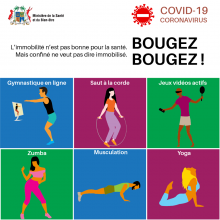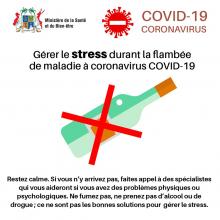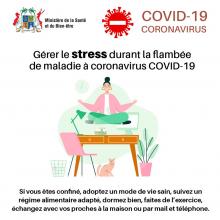How Mauritius is tackling NCD risk factors in the context of COVID-19?
Introduction
The Republic of Mauritius is an island state in the Indian ocean with a population in 2019 of over 1.2 million [i]. Mauritius is a highly acclaimed tourist destination with over 1.3 million tourists recorded that same year [ii].
The island records a high population density of 626 people per Km2 and the highest proportion of elderly (population aged 65+) in sub Saharan Africa, whom accounts for 12% of the population in 2019, on a continent where average [iii] is 3%.This combined with a high prevalence of Non Communicable Diseases (NCDs)[iv], Mauritius was considered among the countries in the African Region the most at risk of a public health disaster due to COVID-19 [v]. Indeed, COVID-19 is an infectious disease caused by the virus SARS-COV2 which affects all populations but more severely the elderly and people living with NCDs, causing increased mortality in these populations [vi].
A year into the pandemic, Mauritius is defeating pessimistic prognosis and the handling of the pandemic is lauded by the international community[vii]. The outbreak was contained on the 26 April 2020 after 39 days with no locally transmitted cases, however in November 2020 two other community cases were reported. Since 26 November 2020, only imported cases are reported in the island.
Mauritius recorded its first three cases of COVID 19 on March 18th, 2020 with incoming travelers testing positive. The government responded very swiftly by imposing several measures including curfew, lockdowns and controlling international travel [viii].
Priority was given to protecting the most vulnerable populations and the government acted by increasing awareness and information sharing on the interplay between COVID-19, risk factors and NCDs with a focus on elderly populations. In fact, in Mauritius NCDs account for 89% of all deaths, and has high prevalence of diabetes and Hypertension, known risk factors for COVID-19 fatality [ix].
Health promotion through Facebook
The country used both traditional and novel channels of communication to reach its population. Awareness raising at community level, on worksites and in schools are alerting on the effects of alcohol, tobacco, unhealthy diet and physical inactivity on health, particularly in the context of COVID-19. Leaflets and pamphlets on all risk factors are regularly distributed in community, at worksites and through school health clubs.
Facebook appears as an important tool to disseminate information but also to capture concerns of the population and amplify messages through sharing posts. The Facebook page Coronavirus Moris, the official Ministry of Health and Wellness (MoHW) page, counts 58 869 subscribers[x]. Key messages from WHO and MoHW are posted on the page daily. Information is shared in Creole, the local dialect as well as in English and French to reach all subgroups of the population and available in all formats: radio, posters, videos, to reach all subgroups of the population. All risk factors for NCDs are addressed: tobacco, harmful use of alcohol, unhealthy diet and physical inactivity, as well as advice for those living with NCDs such as diabetics, people with cardiovascular disease and hypertension, chronic respiratory diseases, and cancers.
The Facebook page was live as of 16th March 2020, before the first cases. From March 16th to 31st the Ministry of Health and Wellness (MoHW) published 5 to 10 posts a day, relaying evidence-based information on COVID-19, on the situation in Mauritius and measures taken by the government to respond and directing population on where to get information and assistance. The information is provided by healthcare professionals, specialists in their field and hence videos on nutrition showcased nutritionists, those on cardiovascular diseases and COVID-19 showcased a cardiologist and videos on tobacco and alcohol featured focal person from the MoHW.
During the period of curfew and national lock down, animated videos were posted on the Facebook page of the Ministry to encourage the population to practice simple indoor physical activities to stay healthy and manage stress. The videos and publications generated thousands of likes and shares. Healthy diet and nutrition were largely covered with the development of short videos and included messages on ways of staying physically active, despite the lockdown. These short videos, each of about 2 minutes duration addressed various needs of the different subgroups of the population and included general messages on healthy diet and nutrition during confinement, for NCD patients, and for the specific needs of children and adolescents.
Other videos on tobacco control and reducing the harmful use of alcohol and on preventing cardiovascular diseases, particularly in the context of confinement and stress generated by the situation, were produced and published where health professionals provided the information on the interplay between the risk factors and COVID-19 and indicated the best way to reduce risk, such as quitting tobacco and abstaining or reducing the amount of alcoholic drinking.
Regulatory measures
Mauritius has in place legal measures that restrict the sales of tobacco and alcohol. The sales of both products are subject to legal requirements such as age limits, restrictions on advertisements, promotion and sponsorship to name a few[xi],[xii] Furthermore, Mauritius imposes taxes of 83.5% on tobacco products, one of the highest in the African Region13. A Toll-free information line for tobacco is available (Line Number 800 2011) and is operational from 8.45 am to 16.00 weekdays only to provide information on tobacco legislations, counselling and refer smokers to smoking cessation services. Seven tobacco cessation clinics are operational, and located in each of the five regional hospitals, and one at O. Leal Community Health Centre in Beau Bassin, one at the Diabetic Vascular Centre in Souillac. They offer both pharmacological and behavioural therapies to support smokers to quit. During the pandemic, key messages from public health practitioners included encouraging smokers to quit and referring to the COVID-19 unique information Line 8924, a hotline for all information on COVID-19 which also provided advice to smokers to quit and referred to adequate services.
Furthermore, the government of Mauritius instituted a total lock down from 24 March to 31 March 2020, for all populations except essential services. Supermarkets were closed and this limited the availability of alcohol and tobacco products. From March 31st, 2020 there was an ease in the lockdown measures but reopening of services were restricted. For example, people could access supermarkets at specific time intervals following the alphabetical order of their name. Premises such as casinos, cinemas and nightclubs were closed and other leisure time, public, sports, social and cultural events were banned and public spaces such as beaches or gardens, where individual and groups may typically meet and consume alcohol were banned until mid-June [xiii]. Front liners and essential services were functional subject to the ‘Work Access Permit’ system.
Conclusion
Mauritius has set an example for the African Region in its overall response to the COVID-19 pandemic and specifically on how to tackle the risk factors for NCDs, which has contributed to limiting the death toll of the pandemic in the country, despite unfavorable circumstances. Mauritius benefited from a solid foundation in health promotion activities and has responded diligently and innovatively to the challenges posed by the pandemic in preventing and reducing tobacco use, harmful use of alcohol, unhealthy diet and physical inactivity.
[i] The World Bank, 2020. Mauritius. [Online]
Available at: https://data.worldbank.org/country/mauritius
[ii] Republic of Mauritius, 2019. Handbook of statistical data on tourism 2019. [Online]
Available at: https://tourism.govmu.org/Documents/publication/Handbook%20of%20Statist…
[iii] The World Bank, 2020. Mauritius. [Online]
Available at: https://data.worldbank.org/country/mauritius
[iv] World Health Organization, 2018.. Noncommunicable Diseases (NCD) Country Profiles, Geneva: World Health Organization.
[v] World Health Organization, 2020. Maurice: WHO plays key role in curbing COVID-19. [Online]
Available at: https://www.who.int/news-room/feature-stories/detail/mauritius-who-play…
[vi] World Health Organization, Information note on COVID-19 and noncommunicable diseases, Geneva: World Health Organization. Available at: https://www.who.int/publications/m/item/covid-19-and-ncds
[vii] Munyaradzi, M., 2020. COVID-19 in Africa: half a year later. The Lancet Infectious Diseases, p. 1127.
[viii] Kowlessur, S. et al., 2020. Tackling the COVID-19 pandemic in paradise: the Mauritian experience. The Lancet Diabetes & Endocrinology, Volume 8, Issue 11, pp. 878 - 879.
[ix] World Health Organization, 2018. Noncommunicable Diseases (NCD) Country Profiles, Geneva: World Health Organization.
[x] Facebook Moris. [Online] Available at: https://www.facebook.com/coronavirusmoris/
[xi] World Health Organization, 2018. Global status report on alcohol and health, Geneva: World Health Organization.
[xii] World Health Organization, 2019. Global report on theTobacco epidemic:offer help to quit, Geneva: World Health Organization.
[xiii] Republic of Mauritius, 2020. Government Notices no 101. The Public Health Act. [Online]
Available at: https://gpd.govmu.org/HomeDownloadSection/101_THE%20COVID-19%20(CLOSING…
NPO (NCDs/HP)
Email: vythelingamv [at] who.int





